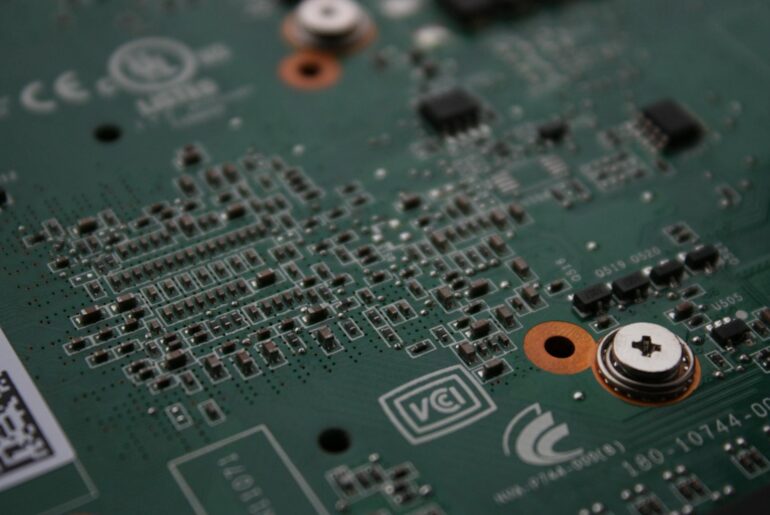This article may contain references to products or services from one or more of our advertisers or partners. We may receive compensation when you click on links to those products or services. Nonetheless, our opinions are our own.
The information presented in this article is accurate to the best of our knowledge at the time of publication. However, information is subject to change, and no guarantees are made about the continued accuracy or completeness of this content after its publication date.
Nvidia stands as a central figure in the rise of artificial intelligence hardware, powering advanced computing applications across industries. Its ascent has been propelled by innovation, strategic market positioning, and a globally integrated supply chain. Yet, growing geopolitical tensions and new waves of protectionist policy, could tariffs disrupt Nvidia’s momentum and the broader evolution of AI?
Tariff Pressures on Nvidia’s Supply Chain
Tariffs on semiconductors and AI-enabling components can significantly alter cost structures and logistics. Nvidia depends on global suppliers, especially in Asia, for key technologies like GPUs and AI accelerators. Any increase in trade friction may trigger cascading effects across its operational model.
Disruptions in Component Sourcing
When core components face tariffs, the resulting cost increases can force companies to consider alternative sourcing or onshoring production. These shifts are often costly and time-consuming.
Effects on Operational Strategy
- Increased Supply Chain Costs: Tariffs elevate the price of imported parts, putting pressure on manufacturing budgets.
- Exposure to Geopolitical Risk: International supply chains are vulnerable to sudden policy changes.
- Product Timelines: Adjusting production workflows may result in launch delays and resource reallocation.
Impact Summary
- Manufacturing Costs: Rising due to tariff exposure
- Product Development Cycles: Risk of delays and inefficiencies
- Retail Pricing: Higher costs may be passed to end users
Trade Policy and Its Influence on AI Momentum
AI infrastructure depends on high-performance chips, consistent access to innovation, and market fluidity. Trade policy shifts can alter these dynamics significantly, especially for companies operating at scale.
Policy-Driven Cost Shifts
Tariffs ranging from 15% to 25% on components like GPUs, logic chips, and AI accelerators can materially raise enterprise infrastructure costs. In turn, this can dampen AI investments and reduce competitiveness.
Broader Industry Implications
- Slowdown in AI Development: Higher hardware costs can limit the number of development cycles, especially for smaller organizations.
- Market Segmentation: Restrictions may isolate certain regions from leading-edge technologies.
- Reduced Hardware Access: AI projects in price-sensitive markets may be postponed or cancelled.
Tariff Snapshot:
- GPUs: 25% estimated import tariff
- AI Accelerators: 20%
- Logic Chips (e.g., CPUs): 15%
These figures reflect general trends across recent U.S.-China trade measures.
Pressures on Profitability and Financial Flexibility
Trade barriers can directly impact Nvidia’s financial performance. Investors and analysts often monitor these developments closely, as they introduce volatility and strategic uncertainty.
Margin Compression and Market Sensitivity
- Rising COGS: Increased input costs challenge gross margins.
- Price Transmission Risks: Passing costs to customers may reduce competitiveness or lead to lower sales volumes.
- Investor Perception: Persistent trade risks can affect market confidence and stock valuation.
Summary of Financial Effects
- Gross Margin: At risk due to rising costs
- Sales Volume: May decline in cost-sensitive regions
- Stock Volatility: Heightened during policy shifts
Voted "Best Overall Budgeting App" by Forbes and WSJ
Monarch Money helps you budget, track spending, set goals, and plan your financial future—all in one app.
Get 50% OFF your first year with code MONARCHVIP
Strategic Positioning in a Changing Trade Environment
As international policies evolve, Nvidia and similar firms must reassess strategic investments and risk management practices.
Investment and Market Reallocation
Investors are reevaluating exposure to global tech companies facing tariff threats, often favoring firms with localized supply chains or greater pricing power.
Portfolio Adjustments Worth Considering
- Diversification: Reduce overreliance on companies heavily dependent on international suppliers.
- Sector Shifts: Rebalance portfolios toward domestic producers where appropriate.
- Geopolitical Monitoring: Track emerging policies that may redefine chip access or exports.
Investment Area Outlook
- AI Hardware Manufacturers: High tariff risk; assess supply chain resiliency
- Domestic Tech Firms: Possible short-term advantage due to reduced foreign competition
- Global ETFs: Review regional exposure and rebalance if necessary
Adapting to Friction in Global Trade
Nvidia’s continued dominance in AI hardware will depend on how well it navigates a more fragmented trade environment. Although the company’s innovation track record is strong, tariffs introduce new challenges related to cost control, market access, and operational continuity.
Factors That May Shape the Next Phase
- U.S.-China Relations: Future agreements or escalations will directly influence semiconductor access and pricing.
- Manufacturing Realignment: Strategic movement toward domestic production could stabilize long-term operations, though with near-term capital demands.
- Competitive Positioning: Other players may gain share if they are shielded from tariff exposure.
Market Forecast Themes
- Trade Barriers: Pressuring short-term profitability
- Export Controls: Limiting product reach in select regions
- Localization Efforts: Likely to increase in response to global uncertainty
Conclusion
Tariffs are a big problem for Nvidia’s carefully built global supply chain. They could raise production costs, cause product delays, and lower profit margins. Even small trade barriers can slow down innovation in the whole industry, especially for smaller companies with fewer resources. This is because AI development needs regular access to advanced chips.
To stay on top, Nvidia will need to take proactive steps like finding new suppliers, looking into making products in the US, and improving its ability to handle geopolitical risks. Investors and people who work with AI will need to keep an eye on trade talks, U.S.-China relations, and semiconductor policy. The company’s ability to quickly adapt to changing tariffs will affect not only its own growth, but also the speed at which AI hardware is developing around the world.
Frequently Asked Questions
How do tariffs influence Nvidia’s profitability?
Tariffs raise the cost of imported materials used in Nvidia’s products. These increases may either be absorbed by the company, affecting margins, or passed on to customers, potentially reducing demand.
Could tariffs hinder AI growth more broadly?
Higher hardware costs can limit access to computing power, slowing research progress and product development across industries. Smaller companies may struggle the most.
How important is China in Nvidia’s supply chain?
China plays a significant role as both a manufacturing base and a key market for Nvidia products. Tariffs or restrictions affecting trade with China could disrupt operations and diminish revenue potential.
Can Nvidia reduce its exposure to tariffs?
Nvidia may mitigate trade risk by diversifying suppliers, shifting some manufacturing to domestic facilities, or investing in more vertically integrated production models.
What should investors consider in light of these risks?
Investors should track global policy changes, analyze a company’s supply chain geography, and assess the ability of that firm to adapt to changing trade rules.

Reviewed and edited by Albert Fang.
See a typo or want to suggest an edit/revision to the content? Use the contact us form to provide feedback.
At FangWallet, we value editorial integrity and open collaboration in curating quality content for readers to enjoy. Much appreciated for the assist.
Did you like our article and find it insightful? We encourage sharing the article link with family and friends to benefit as well - better yet, sharing on social media. Thank you for the support! 🍉
Article Title: Will Tariffs Burst Nvidia AI Growth?
https://fangwallet.com/2025/09/13/will-tariffs-burst-nvidia-ai-growth/The FangWallet Promise
FangWallet is an editorially independent resource - founded on breaking down challenging financial concepts for anyone to understand since 2014. While we adhere to editorial integrity, note that this post may contain references to products from our partners.
The FangWallet promise is always to have your best interest in mind and be transparent and honest about the financial picture.
Become an Insider

Subscribe to get a free daily budget planner printable to help get your money on track!
Make passive money the right way. No spam.
Editorial Disclaimer: The editorial content on this page is not provided by any of the companies mentioned. The opinions expressed here are the author's alone.
The content of this website is for informational purposes only and does not represent investment advice, or an offer or solicitation to buy or sell any security, investment, or product. Investors are encouraged to do their own due diligence, and, if necessary, consult professional advising before making any investment decisions. Investing involves a high degree of risk, and financial losses may occur including the potential loss of principal.
Source Citation References:
+ Inspo
There are no additional citations or references to note for this article at this time.












































